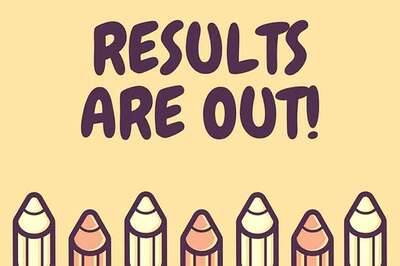
views
Does everything happen for a reason?

It really depends on how you think about “reason” in this context. This is one of those really complicated topics with no clear-cut objective answer, and a lot of this comes down to your beliefs about the universe and your understanding of the phrase. Does it mean “everything in your past has made you who you are today,” or “God is in charge of everything that happens to me,” for example? It all depends on your interpretation. For many people, "fate" can help make sense of painful events. In tough times, some feel a sense of calm because they can feel that their pain serves a greater purpose, and that's a comforting thought. Some people use this phrase to explain occurrences that otherwise have no explanation. They feel like they obviously can’t understand everything, but sense a deeper cause or design to things.
Why People Believe Everything Happens for a Reason

They believe a higher power is in charge of things. If you’re religious or you believe in destiny, you likely believe that forces greater than yourself are in charge of things. Either God is in charge, and He knows everything that’s going to happen, or the universe has plans for you that you can’t understand. Perhaps trials and tribulations are designed to test your faith, or maybe there’s a light at the end of the tunnel that God wants you to see for its all glory. If you believe God is omnipotent and that God doesn’t allow life to develop chaotically, then everything must happen for a reason!

They think anything can be a learning experience if you have a growth mindset. If you really think about it, everything can make you stronger depending on how you orient your thinking. If you can find even one productive takeaway from a trauma, mistake, or random source of pain, then everything has value. For example, if you randomly lose your job, maybe it brings you back to the drawing board and reconnect with your original career goals? Maybe this is the motivation you ultimately need to go back to school? There’s always a bright light at the end of the tunnel.

They see how even “meaningless” pain can make you more resilient. Perhaps everything happens for a reason in the sense that whatever trouble or pain you run into is just toughening you up for the future. Friction sharpens even the dullest stones, and you don’t toughen up when things always go your way. Perhaps success is just the universe’s way of rewarding you for hard work and failure is the universe’s way of making you more resilient for the future. It’s easy to get down when bad things happen, but if you look at difficulties in life as something that helps you learn how to handle them, you’re just going to get tougher and tougher over time!

On a literal level, they know everything does happen for a reason. There are no phenomena in the known universe that violate the principles of cause and effect. Newton’s third law of motion dictates that for every action there is a reaction. If you drop a ball, it hits the floor. In this sense, everything does happen for a reason. If the laws of cause and effect are responsible for all observable events in the real world, why wouldn’t it apply to things we can’t see or understand entirely?
Why People Don’t Believe Everything Happens for a Reason

They don’t see evidence for a grand design behind everything. Nobody can prove that there is some metaphysical architect or mysterious force setting the events of the world into motion. While the laws of motion certainly exist when it comes to causality, there’s no indication that there’s anything outside of that pulling the strings. While everybody has their own beliefs, you could make this argument convincingly.

They feel like some events and phenomena occur at random. Every single day, there are people randomly hit by drunk drivers, lottery tickets that make millionaires despite the incredible odds, and bugs that develop in otherwise perfect pieces of code. Things just sort of happen sometimes, and there doesn’t appear to be much rhyme or reason to them. Sometimes, bad things happen to good people and good things happen to bad people and there isn’t much you can say about it when it comes to greater lessons about life or deeper meanings.

They worry it can downplay their responsibility to challenge themselves. If you write off random troubles or obstacles as something happening for a reason outside of your control, you may accidentally be letting yourself off of the hook when you should be holding yourself accountable. For some people, “everything happens for a reason” is a crutch, and if that line of thinking isn’t making your life better or more productive, it may not be a good way to think about things. This doesn’t mean that you have to go through life forcing yourself to take responsibility for all pain you experience—just that you may want to avoid writing off your power.

They think some pain is just a normal and universal part of life. Everybody suffers at some point or another. Whether we like it or not, none of us are going to be here forever. If that part of life is universal, then maybe there’s nothing meaningful in it? Maybe it’s just part of the human condition? If you take this perspective, then it’s hard to assign any kind of meaning to it. Even if you are a religious person, that doesn’t mean you have to believe a higher power is singularly responsible for every minor pain in life. If people have free will, then they have the free will to hurt one another, after all.
So should I believe everything happens for a reason?

You should believe whatever brings you the most comfort and utility. You should believe in some things because they’re objectively true. A triangle will always have 3 sides and there’s not much debate there. Other things are a matter of personal perspective and intuition. If believing in a higher power or that “everything happens for a reason” makes you a better version of yourself, then believe it. Some people find comfort in the fact that every obstacle has value and importance. Some people find the notion upsetting and needlessly mysterious. Everyone has their own truth, and that’s 100% okay.


















Comments
0 comment